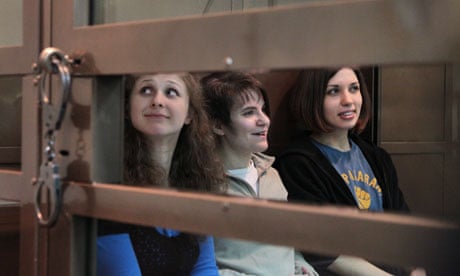Vladimir Putin has said the three jailed members of the anti-Kremlin punk band Pussy Riot "got what they asked for", days before a Moscow court is due to consider their appeal.
"It was right that they were arrested, and the court's decision was right," Putin told a journalist at NTV, a state-run television channel, during an hour-long documentary aired in honour of his 60th birthday on Sunday.
Maria Alyokhina, 24, Nadezhda Tolokonnikova, 22, and Yekaterina Samutsevich, 30, have been held in a Moscow detention centre since their arrest in March. They were
sentenced to two years in prison in mid-August on charges of "hooliganism motivated by religious hatred" after performing an anti-Putin "punk prayer" in a Moscow cathedral. They are to appeal against the sentence on Wednesday.
A lawyer for the women, Nikolai Polozov, said Putin's comments were part of "a planned propaganda campaign aimed at getting the court to form a negative opinion" in the appeal case. "This is pressure on the court." He compared it to comments Putin made before the sentencing on 17 August, when the powerful president said he thought the women should not be judged "too harshly". They were subsequently handed a two-year sentence instead of a possible seven.
Putin claimed on NTV that he had played no role in the case. "I have nothing to do with it," he said. "They got what they asked for."
The three women have been held in a Moscow detention centre since their arrest in early March. They have apologised for offending Russian Orthodox believers, but have insisted that their performance was a political act.
Putin initially reacted to a question about the band with visible disgust and a laugh, asking the journalist, Vadim Takmenyov, whether he knew how to translate their name – Takmenyov said he could not say the word in front of Putin.
"You see, if you can't say it in front of me, it means it's an indecent word. These girls must be talented – they forced you all to say that word," Putin replied. "Is that normal?"
"One must not erode our moral foundation and undermine the country. What would be left then?" the president wondered.
The New Times, an independent magazine, aired a video on its website on Monday of Tolokonnikova inside her cell, a dingy green room stacked with bunk beds, blankets and a pile of boxes of milk. She is asked if she has enough books to relax and replies: "I don't want to relax, my whole life is devoted to work." The women have remained defiant throughout their case.
Putin used his birthday documentary as a chance to rubbish Russia's opposition movement, saying: "There are many here who don't want Russia to get stronger.".
When asked if he followed polls – which show that Putin's popularity has slipped from heights that regularly had him polling at 70% approval ratings – the president said: "I have a chemical, an internal feeling, in the correctness of what I'm doing." Putin's latest approval ratings have fallen to a post-election low of 37% in one survey and even pro-government pollsters only have him at 48%.

Comments (…)
Sign in or create your Guardian account to join the discussion